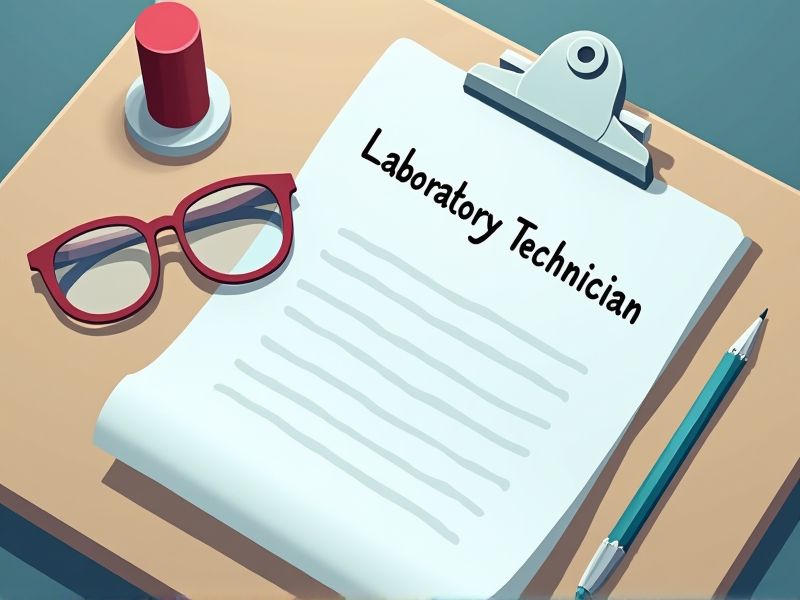
Laboratory Technicians handle complex instruments and procedures that demand a high degree of precision and expertise. Certifications validate their skills in managing safety protocols and ensuring accurate test results. Employers value technicians who have certified credentials, indicating a commitment to maintaining industry standards. Some important certifications you may need as a Laboratory Technician include these.
ASCP Certified Medical Laboratory Technician (ASCP-MLT)
Obtaining the ASCP-MLT certification validates a technician's competence and knowledge in the medical laboratory field, ensuring high standards of practice. Certification by ASCP often leads to increased job opportunities, as many employers prefer or require credentialed professionals. ASCP-MLT holders tend to have higher earning potential compared to their non-certified counterparts. The certification process includes continued education requirements, fostering ongoing professional development and adaptation to advancements in medical technology.
American Medical Technologists (AMT) Medical Laboratory Technician Certification
The AMT Medical Laboratory Technician Certification demonstrates competency and knowledge in essential laboratory skills, ensuring laboratory technicians meet industry standards. Certification helps in higher employability as employers often prefer certified professionals for their assurance in quality and reliability in laboratory tasks. This certification enables laboratory technicians to stay updated with evolving medical technologies and practices, fostering continued professional growth. Certification aids in compliance with regulatory requirements, ensuring that laboratory practices adhere to national healthcare standards.
National Credentialing Agency for Laboratory Personnel (NCA) Medical Laboratory Technician Certification
The National Credentialing Agency for Laboratory Personnel (NCA) Medical Laboratory Technician Certification validates a technician's knowledge and skills, ensuring they meet industry standards. Certification can enhance job prospects and career advancement opportunities within the field. Employers often prefer certified technicians as it demonstrates a commitment to maintaining high professional standards and staying current with technological advancements. Certification helps improve patient safety and care by ensuring technicians are competent in performing accurate laboratory tests.
Clinical Laboratory Improvement Amendments (CLIA) Compliance Certification
The Clinical Laboratory Improvement Amendments (CLIA) Compliance Certification ensures that laboratory technicians uphold precise standards for accuracy and reliability in test results. Without CLIA certification, a lab technician's work may lack the necessary validation to be accepted in medical decision-making processes. CLIA compliance ensures laboratories maintain quality control procedures, reducing the risk of diagnostic errors. The certification is crucial because it instills confidence in clinicians and patients regarding the trustworthiness of laboratory data.
OSHA Laboratory Safety Certification
OSHA Laboratory Safety Certification ensures laboratory technicians understand necessary protocols to minimize exposure to hazardous chemicals, directly reducing the risk of accidents. Certification enhances compliance with federal regulations, preventing potential legal ramifications for both employees and employers. Training under OSHA standards equips laboratory technicians with skills to efficiently identify and address potential safety hazards. Employers prioritize hiring certified technicians, as it demonstrates a commitment to maintaining a safe and health-conscious laboratory environment.
NAACLS-Accredited Program Completion Certification
NAACLS accreditation ensures that a laboratory technician program meets strict educational standards, leading to competent and qualified professionals. Completing a NAACLS-accredited program often enhances employability, as employers recognize the value of standardized education. Accreditation signifies thorough preparation in necessary competencies, reducing errors in clinical settings. Certification from such programs often serves as a prerequisite for obtaining licensure or certification examinations, aligning professional practice with regulatory requirements.
College of American Pathologists (CAP) Proficiency Certification
The CAP Proficiency Certification ensures that laboratory technicians meet a standardized level of expertise, enhancing the quality and reliability of diagnostic results. By obtaining this certification, technicians demonstrate their commitment to maintaining rigorous safety and procedural standards in laboratory operations. The certification process involves assessments that help in identifying gaps in knowledge or practice, fostering continuous professional development. Consequently, laboratories that employ CAP-certified technicians often experience increased trust and credibility from healthcare providers and patients.
HAZMAT Awareness Certification for Laboratory Personnel
HAZMAT Awareness Certification equips laboratory technicians with the ability to recognize hazardous materials, which directly reduces the likelihood of accidents and exposure-related incidents. This certification ensures technicians can understand and interpret safety data sheets, which is crucial for maintaining regulatory compliance and safety protocols. Knowledge gained from HAZMAT training enhances the response capability during emergencies, minimizing potential harm to personnel and the environment. As laboratories handle diverse chemicals, certification promotes a safer workplace culture, leading to long-term reductions in health risks and operational disruptions.
Certified Phlebotomy Technician (CPT)
Laboratory Technicians with Certified Phlebotomy Technician (CPT) credentials demonstrate specialized proficiency in blood collection techniques, which enhances the reliability of lab results. The CPT certification ensures adherence to strict safety and handling protocols, thereby reducing the risk of contamination or error. Having CPT-certified personnel can lead to enhanced patient satisfaction and trust, as it signifies competence and professionalism. The CPT credential can also improve job prospects and career growth within laboratory settings due to its recognized validation of skills.
CPR and First Aid Certification
Laboratory technicians often work with hazardous materials, increasing the risk of accidents, and CPR and First Aid Certification equips them to respond effectively in emergencies. This preparedness can prevent injuries from worsening and potentially save lives in critical situations. The certification also demonstrates compliance with safety regulations, enhancing the safety culture within the lab environment. Employers value certified staff, as it signifies a commitment to workplace safety and can reduce liability.
Summary
When you earn certifications as a Laboratory Technician, your confidence and expertise can increase significantly. This often leads to improved job performance and a higher likelihood of career advancement. As a result, you may become more competitive in the job market and see an increase in job opportunities. Employers may also value your credentials, potentially leading to higher salaries and job stability.
